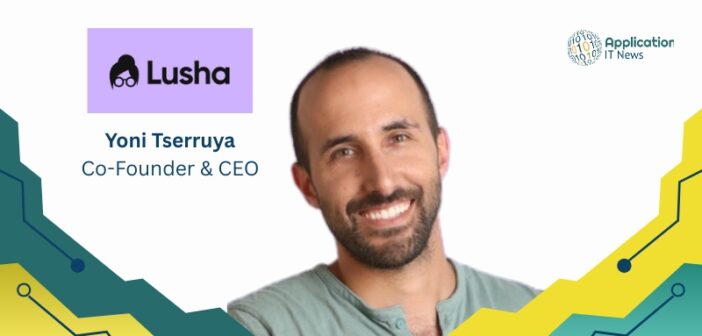Founded in 2016 by Assaf Eisenstein and Yoni Tserruya, Lusha has grown into one of the world’s leading platforms for B2B sales data and Sales Streaming. Designed as a “Waze for salespeople,” Lusha delivers accurate, accessible prospecting data through its platform, browser extension, and API. Today, the Lusha community includes more than 670,000 sales professionals and over 223,000 organizations—including global leaders such as Zendesk, Google, and Yotpo—who rely on Lusha to identify, engage, and convert high-value prospects with unparalleled speed and simplicity.
Yoni Tserruya, Co-Founder and CEO of Lusha, has been instrumental in shaping the company’s vision and redefining the future of sales intelligence. A lifelong builder rather than a traditional salesperson, Yoni created Lusha from a genuine need he encountered in the recruiting space, ultimately uncovering a broader opportunity to transform how sales teams operate. His leadership emphasizes adaptability, creativity, and context over rigid processes, especially as AI accelerates change across the industry. Under his founder-led guidance, Lusha continues to pioneer Sales Streaming and develop AI-driven tools that help sales teams connect more effectively, work more efficiently, and scale with confidence.
1. Can you share the most interesting story that happened to you since you started your career, especially one that shaped your leadership approach at your current company?
In our early days, we moved fast. Everything was instinct, curiosity, building, launching. But as Lusha grew, we started introducing big-company playbooks, things like OKRs. At first, it helped us align. But over time, I saw the downside. People started optimizing for the goal, not the mission. It created fear, rigidity, a sense that experimentation was risky.
That moment taught me that leadership at scale isn’t about control, it’s about context. You have to set the direction clearly, then give people freedom to navigate. Especially in this new world, where AI is moving the ground beneath us, you need teams that can learn, adapt, and move. My job is to protect that flexibility and to make sure we’re building a company that encourages creativity, not boxes it in.
2. What initially brought you to this specific career path, and how did it lead to your role in this company?
I’ve always been a builder. Lusha wasn’t born from a business plan, it was born from a problem. I met my co-founder Assaf, we saw a gap in the recruiting world, and we started building something to fill it. It worked. Then salespeople started using it. So we shifted. It grew. And one day I realized, “Oh, I guess I’m the CEO now.”
I never set out to lead a big company. But I kept building, and people kept joining. So I kept going. And the more I leaned into the product, the more I found meaning in the mission: helping people connect, removing friction from the sales cycle, making technology feel like magic.
Submit your own Executive Q & A to DigitalITNews:
3. What makes your company stand out from competitors in the market? Can you share an example that highlights this?
Three things: simplicity, our data, and sales streaming. Simplicity means that any seller, not just the tech-savvy ones, can start using Lusha and get value immediately. No manual, no training call, just plug in and go.
Second is our data, and what we do with it. We’re not just a search engine, we stream opportunities to you. Think of it like Spotify for sales: we learn your style, your “playlist,” and we deliver leads based on signals and patterns, not guesswork. That’s the core of what we call Sales Streaming — a shift from hunting to receiving.
This unlocks a whole new experience. You stop searching, and just sell.
4. Are you working on any exciting new products or projects? How do you think this innovation will positively impact your customers?
Yes, we’re building a conversational sales agent. No menus, no workflows, you ask it to find you potential buyers, and it does just that. We’re heading into an era where software is no longer a UI , it’s a teammate. Salespeople spend 70% of their day not selling. Our goal is to automate all of that: prospecting, data entry, admin work, so reps can do what they love: talk to people, build trust, close deals.We’re rebuilding the sales experience around what makes sellers human, and making everything else disappear into the background seamlessly.
5. What was the tipping point for your company’s recent success? Was there a change in strategy or approach that others might learn from?
We started out as a product-led growth company, people tried Lusha on their own and shared it inside their teams. That gave us incredible scale early on. But the real shift came when we built a sales org on top of that strong PLG offering. That combination unlocked massive growth.
The mistake some companies make is treating PLG and sales-led like opposing models. In reality, they work best together. PLG brings in warm, qualified users. Sales helps them scale. And today, we see the next frontier: PLG + Ask. Simplicity, paired with real-time intelligence and human touch, we’re building a product people can talk to.
6. Can you share a significant challenge your company faced and how you overcame it? What key lesson did that experience provide?
When we started, the data space had no real privacy standards. Compliance changed everything. We had to rebuild core parts of our product, our infrastructure, even our mindset — to meet the highest standards globally.
It wasn’t just a legal effort, it was a full-company transformation. But we leaned in, and today, we lead with compliance and transparency. The lesson learned here is that sometimes external pressure forces the internal growth you didn’t know you needed. And the real challenge is balancing compliance with innovation, making sure one doesn’t kill the other.
7. In just a few words, what differentiates your leadership role from others in the company? What impact does this have on company culture or product success?
My job is to keep us uncomfortable in the right direction. To zoom out, to see what’s coming, and to help the team believe it’s worth going there.
The hardest problems always land on your desk as CEO, after all the talent we have we’rent able to solve them. But the real impact is in how you make decisions: Do people trust them? Do they feel part of the story? That’s the culture. That’s the product. That’s everything.
To learn more about how Lusha is transforming the landscape of sales intelligence, explore the full Executive Q&A.
Related News:
Q&A: Dr. Loina Prifti on Leading Human-Aligned Digital Transformation at Nerisia
Q&A: Jamie Frew and Carepatron Redefines the Healthcare Workspace

